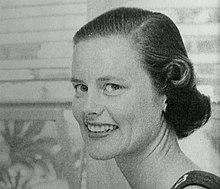Sharla Boehm
Sharla Boehm | |
|---|---|
 Sharla Boehm in 1957 | |
| Born | 1929 Seattle, Washington, United States |
| Nationality | American |
| Alma mater | University of California, Los Angeles |
| Scientific career | |
| Fields | Packet switching |
| Institutions | RAND Corporation. |
Sharla Boehm, née Perrine, (born 1929, Seattle)[1] is an American computer scientist who carried out pioneering work in packet switching while working for the RAND Corporation in the 1960s.[2]
Biography[]
Born in Seattle in 1929, Sharla Perrine moved to Santa Monica three years later. After graduating in mathematics from the University of California, Los Angeles, she taught mathematics and science in Santa Monica schools. She began to work at RAND in 1959 where she met her husband to be, Barry Boehm.[1]
In 1964, together with her colleague Paul Baran, she published a paper titled "On Distributed Communications: II. Digital Simulation of Hot-Potato Routing in a Broadband Distributed Communications Network".[3] As her name appears first in the original paper, she seems to have been the one who was behind the simulation programmed in Fortran, showing that packet switching (or "hot-potato routing" as it was called) could indeed work.[2]
In RAND and the Information Evolution, Baran describes how Boehm carried out various simulations under different conditions, demonstrating that the protocol routed traffic efficiently. In particular, it was discovered that if half the network was destroyed, the remainder reorganized and began routing again in less than a second.[4]
In a 1996 paper on "An Early Application Generator and Other Recollections", Barry Boehm notes that Sharla Boehm "had developed the original packet-switched network simulation with Paul Baran", a development which led him to become involved in the pioneering ARPAnet Working Group.[5]
References[]
- ^ a b Berman, Michael (12 May 2015). "Finding Sharla Boehm". The Edtech Curmudgeon. Retrieved 28 October 2018.
- ^ a b Berman, Michael (12 March 2015). "Who is Sharla P. Boehm?". The Edtech Curmudgeon. Retrieved 28 October 2018.
- ^ Baran, Paul; Boehm, Sharla P. (1964). "On Distributed Communications: II. Digital Simulation of Hot-Potato Routing in a Broadband Distributed Communications Network". RAND.
- ^ Ware, Willis H.; Chalk, Peter; Warnes, Richard (2008). RAND and the Information Evolution: A History in Essays and Vignettes. Rand Corporation. pp. 119–. ISBN 978-0-8330-4816-5.
- ^ Boehm, Barry (1996). "An Early Application Generator and Other Recollections". USC Center for Systems and Software Engineering. Retrieved 28 October 2018.
- 1929 births
- Living people
- American computer scientists
- American women computer scientists
- RAND Corporation people
- 20th-century American scientists
- 20th-century American women scientists
- 21st-century American scientists
- 21st-century American women scientists